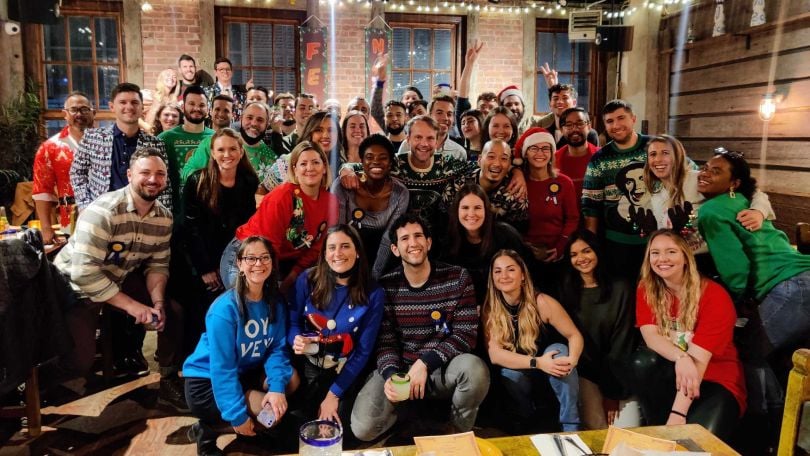Authenticity is an asset. Yet it’s not uncommon to leave bits and pieces of ourselves outside before stepping into the office or logging on for a team meeting on Zoom.
Sometimes presenting our genuine thoughts, emotions and ideas to others feels dangerous — and holding back our authenticity becomes a self-inflicted wound. Perhaps we dampen our own voices for fear that it’s not our place to share feelings or take risks. Many feel their authentic selves and ideas won’t be received well or taken seriously.
Other times the issue is the work environment itself. Strict hierarchies are reinforced, limiting the range of people who can make meaningful contributions to strategy and effectively curbing the ability to share input. Additionally, a closed-off company culture can cause us to feel isolated or disengaged.
In 2022, the Society for Human Resource Management conducted a survey to assess the state of psychological safety for U.S. workers. Interestingly, remote and hybrid workers were less likely than those who work in person to report that they were sometimes rejected for being different and that they find it difficult to ask team members for help.
But actions by employers are just as important as a remote or hybrid structure. By fostering a psychologically safe environment where employees are encouraged to speak up and be taken seriously, taking risks can be seen as a learning opportunity and team members can feel empowered to bring their genuine selves to work.
At quantilope, for example, there are “popcorn method” meetings — during which team members call on each other at random to share input and ensure that everyone gets a chance to contribute thoughts and ideas. At Unqork, encouraging individuals to take risks is approached not with broad strokes but with consideration of what works best on a person-by-person basis.
Leaders at both companies sat down with Built In NYC to learn more about what goes into creating a psychologically safe workplace, and which methods can best be implemented to help everyone be their authentic selves.
Unqork is a DIY enterprise SaaS platform that enables users to create no-code software applications via its drag-and-drop interface.
How does Unqork make psychological safety an explicit priority in the workplace?
Psychological safety means the environment allows for individuals to take risks, especially when interacting with each other. It’s important to note that feeling safe to take risks in the workplace can look vastly different for each person. A few examples are: Amplifying a colleague’s idea in a meeting because they were spoken over or didn’t receive credit, providing an alternate perspective that yields different results, sharing an emotional personal story that connects team members more closely and addressing an issue without fear of retaliation.
At Unqork, we create a safe environment starting from the interview process that lasts throughout an individual’s tenure. We include DEI responsibilities for every role and level. We ask DEI-based questions specifically tailored to individual contributors and managers who will have direct reports. By taking these initial actions, we hire people that don’t need to be sold on DEI. They understand the value of fostering safe spaces for others to thrive. We conduct trust-and-respect-building sessions monthly, equipping leaders with the tools to create safe environments and notice an unsafe environment that doesn’t offer psychological safety.
Share your favorite tip for facilitating meetings in which every voice is heard.
My favorite tip for facilitating inclusive meetings is setting the expectation that each individual in the meeting will be called on to provide their perspective. This allows for folks to be present during the meeting and actively listen to various perspectives. It’s important for the facilitator to take notes of what each person said, acknowledge, and share how their voice sparked a new idea, solution and presented the challenge. Over time, people will naturally speak up regardless of power dynamics, because they feel psychologically safe to do so.
At Unqork, we look at failure differently because that word is subjective and rooted in bias. One taking a risk and not reaping the standard result doesn’t necessarily mean they failed.”
Innovation doesn’t happen without risk-taking, and risk-taking can lead to failure. How do you create space for risk-taking? And if someone fails, how do you transform the experience into a learning moment?
At Unqork, we look at failure differently because that word is subjective and rooted in bias. One taking a risk and not reaping the standard result doesn’t necessarily mean they failed. As a manager with direct reports, I give my team the space to be creative in the development process. I task them with projects that allow them to grow and flex their skillset. When the result isn’t impactful, we discuss the intention, learnings and new solution as a team. This method promotes psychological safety.

Marketing tech company quantilope is a platform that helps brands expedite and centralize consumer research projects.
How does quantilope make psychological safety an explicit priority in the workplace?
At quantilope, we highly value mental health and offer a number of mental health tools to all employees. One example is our Mental Health committee. Members of this group meet monthly to discuss programming and opportunities to strengthen our company-wide offerings. As an example, last year, the committee supported the credentialing of 5 Mental Health First Aiders to be additional resources to our global team. Employees can schedule time with any of these individuals to have a confidential conversation when something is on their minds.
We also run a quarterly mental health barometer survey to determine how the team is feeling as a whole. We can use the results to determine additional resources that increase our mental health. For example, our newest mental health offering, our Quantiwell days, will launch in February. They occur four days per year (one each quarter) and will allow our entire global team to have a day off from work to focus on something that supports their mental health. Nothing is off-limits as long as they’re not answering Slack!
Share your favorite tip for facilitating meetings in which every voice is heard.
We like to use the “popcorn” method, meaning once someone speaks, they call out the next person to share. This tends to keep everyone engaged because they need to listen to who’s shared before them. This ensures every voice is heard!
Our company value, “Doer,” especially supports risk-taking at quantilope. This encourages us to always try new ways of working that may lead to greater success and advancement.”
Innovation doesn’t happen without risk-taking, and risk-taking can lead to failure. How do you create space for risk-taking? And if someone fails, how do you transform the experience into a learning moment?
Our company value, “Doer,” especially supports risk-taking at quantilope. Part of our definition of Doer is “We own our actions both in success and failure.” This encourages us to always try new ways of working that may lead to greater success and advancement. We also value the lessons we learn when we experience failure, and we share them with each other during our “fuck up nights,” where employees can volunteer to share a mistake they’ve made and what they were able to gain from it. Sharing these experiences allows us to learn from each other and fosters a safe space for trial and error in the future.









